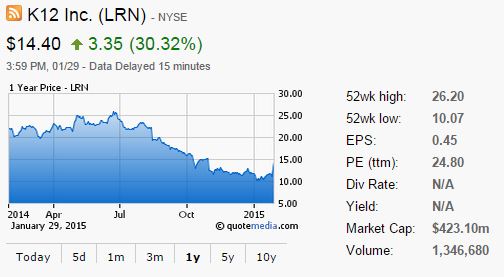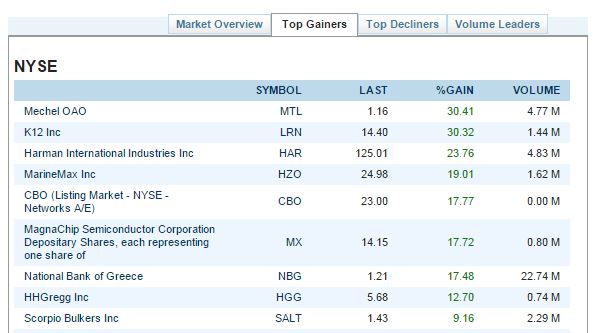K12 Inc. Is Second Largest ‘Gainer’ on New York Stock Exchange
K12 Inc., a publicly traded online education company that had experienced significant drops in its stock value in recent years, was the second highest “gainer” on the New York Stock Exchange at the close of business on Thursday, following the release of its second quarter earnings report for fiscal year 2015.
A number of factors influenced the stock’s performance, including earnings per share that were better than expected and some favorable news delivered by the company’s chairman and CEO, Nate Davis, in a conference call Thursday morning.
Davis cited the Herndon, Va.-based company’s prospects for opening new cyber schools in various states and counties, and the fact that revenue growth from the Fuel Education part of its business is “now coming in as planned.” Fuel Education is a divsion of K12 Inc. that offers personalized learning platforms, teacher professional development, consulting, and Web-based courses.
Last year, the company faced a major setback when the 10,800-student Agora Cyber Charter School in Pennsylvania decided to become self-managed beginning July 1, 2015, rather than continue to pay the company to manage it. Davis conceded that the Agora situation remains a challenge in terms of predicting income. The school plans to continue using K12’s curriculum, under a 3-year contract beginning in 2015-16, which is good news for the company. But the amount of money K12 receives for its curriculum services is dependent on how many students the cyber charter school enrolls, and how much curriculum it uses. If it attracts fewer students, that would mean less revenues for the company. And, if Agora develops some of its own curriculum, that would reduce revenues, because it would need less of K12’s.
But that possibility didn’t seem to dampen the spirits of Wall Street. The company’s stock, which trades under the ticker symbol LRN, opened at $11.22 per share on Thursday. It jumped to $14.45, and ultimately closed at $14.40 per share, which meant investors interpreted the results as “good news,” according to Trace Urdan, a managing director and senior analyst at Wells Fargo Securities, LLC.
Urdan said the prospects of more virtual school business and more digital content sales were viewed favorably by investors, as was the fact that the results beat the consensus among analysts that K12’s projected earnings per share would increase by 29 cents per share. Instead the earnings per share increased by 33 cents.
The company’s net revenues for the second quarter of fiscal 2015 were $231.3 million, compared with $223.9 million in the second quarter of fiscal 2014.
Key points Davis made about K12’s work included:
- The company will manage the Maine Virtual Academy, which will open in the 2015-16 school year, serving 7th to 12th graders.
- It is waiting to hear in February whether it has approval to open a virtual academy in North Carolina for next year.
- In Florida, the company wants to expand its virtual school offering to more counties.
- Fuel Education has seen a significant increase in the number of schools where teachers opt to deliver its online instruction, without relying on the model of having company-provided support from state-certified subject matter expert teachers. “Students taught by district-employed teachers more than doubled year over year,” he said.
Davis pointed to a larger context in his conference call remarks: “This means schools are beginning to accept online learning as a mainstream curricular programming solution,” he said. “Fundamentally, this also means districts and their teachers are using online courses to replace textbooks and other content historically utilized in the classroom.”
As for K12 stock, the rebound comes after it took a long slide from its 52-week high of $26.20 per share in mid-2014.
 It’s worth noting that when interviewed by Education Week last year about K12’s troubles and declining stock price at the time, Gary Miron, a professor of education at Western Michigan University who conducts research on for-profit and nonprofit education management organizations, predicted the increase.
It’s worth noting that when interviewed by Education Week last year about K12’s troubles and declining stock price at the time, Gary Miron, a professor of education at Western Michigan University who conducts research on for-profit and nonprofit education management organizations, predicted the increase.
“We’ll see their stock go up,” he said, noting that “what matters to investors isn’t the same as what matters to taxpayers or policymakers.”
Related Stories:
- K12 Inc. Loses Ground in Contract With Major Cyber Charter School
- K12 Inc. Building a New Identity for Part of the Company
- NCAA Bans Coursework Completed by Athletes in 24 K12 Inc. Virtual Schools
Image credits:
- Top chart from The Street
- Bottom chart from Seeking Alpha


It is completely unethical to use children and adolescents as a way to make money. This in inhumane, in every sense of the word. Let’s stop using our hard earned tax dollars to pay someone to make money on the most democratic idea–public schooling for all. Let’s stop approving charter schools and stop giving permission to our legislators to fund these unprofessionals who hire uncertified teachers and administrators. Return education back to the professionals–certified teachers and administrators in traditional public schools. See the book, Why America’s Public Schools Are the Best Place for Kids: Reality vs. Negative Perceptions (2012, available in all formats at http://www.rowman.com.
I presume your next missive will exhort public-school teacher unions to revert to their pre-Kennedy status as professional organizations. Once they stop stripping cash flow from the public fisc for things like pensions, we might be able to invest more in learning.
The issue isn’t for-profit vs. non-profit. The issue is the quality of education students receive. The profit motive is a powerful incentive to seek effective learning at an efficient cost.
Now, if you’re concerned that for-profits might have a sweetheart deal with the politicians, I would concur that it’s a risk. However, you have to recognize that there’s a massive risk in the public non-profit sector whereby politicians promise "deferred money" in exchange for votes and for union foot soldiers to rustle up the votes that keep them in office. The payoff for services rendered becomes a burden on those same students when they grow up to be taxpayers – and in many states the obligation to pay is embedded in their constitution.
So please, don’t refer to "making money" as an ethics issue. The ethical issue is whether you give the best value you can for the money – and are willing to step aside without a fight when someone who can give better value comes along. That is a prescription that applies equally to for-profit and non-profit providers.
I always receive the best information from your site. So, I feel that your site is the best. I am waiting for new information from you. Thanks for your great site. I thought of sharing the updated list of websites here that should help you further and are not limited.